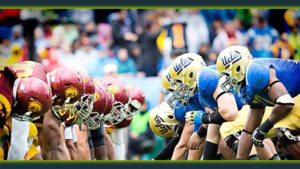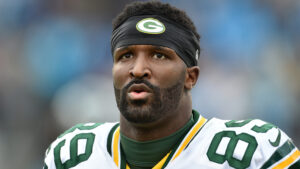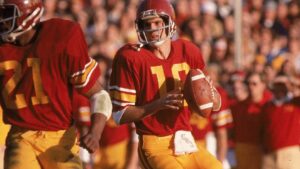Paul McDonald felt like he was dreaming. He arrived on campus at USC with a full scholarship to play quarterback for his dream school. The Trojans made regular trips to the Rose Bowl and were often in the hunt for a national championship. There was no place he’d rather be. However, the feel-good moment didn’t last very long.
As he walked onto the field for his first practice, McDonald saw a shirtless player flinging passes 70 yards downfield with seemingly little effort. McDonald recalls the moment. “This dude was built like Adonis or some Greek god. I asked out loud, ‘Who’s that linebacker that can throw the ball like that?’ The wide receiver walking with me said, ‘No dummy, that’s the quarterback. That’s Vince Evans.’” A flood of insecurity washed over McDonald. He thought to himself, “Oh my god. If you’ve got to look like that and throw like that, I will never play here.”
McDonald went out to warm up with all the quarterbacks when the next moment of self-doubt hit him. There were eight other quarterbacks and when they started playing catch, McDonald was the lone man without a partner. He replays the moment. “I had to grab a student manager to throw with me. As the rookie on the squad, I was on the bottom rung of the totem pole, the 9th String quarterback on a team that had nine quarterbacks!”
McDonald started out as the rookie, on the outside looking in, ninth out of nine, but two years later he was the starting quarterback on the Trojan’s 1978 national championship team. A year after that he was named All-American, drafted by the Cleveland Browns, and went on to play eight years in the NFL.
How did he go from ninth on the depth chart to national champion, All-American, and NFL quarterback? In the GameChange podcast, Thru the Tunnel, McDonald, the company co-founder, says, “I knew I had no chance to become Vince Evans. I knew my body. I knew what I was capable of.”
Instead of trying to become someone he could never be, McDonald set out to focus on making his strengths the things that gave him a competitive advantage. He explains, “I had a good head on my shoulders so I could learn the offense, learn the playbook, understand how to read coverages, understand how to go through progressions, and check downs, and call audibles as a quarterback. I had a good work ethic, and I could pinpoint the throws.” He adds, “Also, I listened to the coaches. I was very coachable. I did what they wanted to do.”
By focusing on his strengths and making them his secret sauce, McDonald climbed the ladder of the depth chart to become a very successful college quarterback and have a professional career in the NFL. He states, “If I had just worked on my weaknesses, I would have never risen to the caliber of player that I became, and, quite honestly, I don’t think I would have ever gotten off the bench at USC.”
Although it is important to shore up our weaknesses, an obsessive focus on our weaknesses has multiple negative impacts. Only focusing on our weaknesses carries the danger of creating a negative mindset where you start to doubt your ability to achieve anything in life. How can you think about the good things you can accomplish if you are only paying attention to the stuff that you are bad at?
We each have our own set of unique gifts and focusing on our strengths allows us to set ourselves apart. It creates a positive mental environment where we feel good about those abilities. McDonald’s success story is a great example that doubling down on your strengths is something we should all do.







